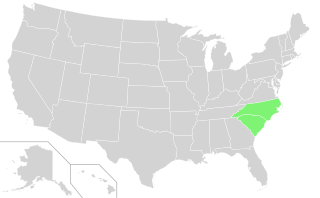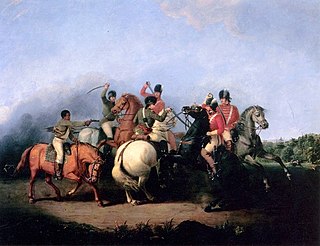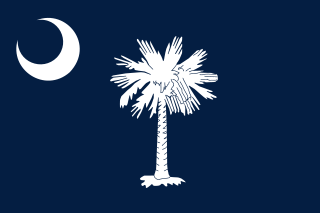
The Thirteen Colonies, also known as the Thirteen British Colonies or the Thirteen American Colonies, were a group of British colonies on the Atlantic coast of North America founded in the 17th and 18th centuries. They declared independence in 1776 and formed the United States of America. The Thirteen Colonies had very similar political, constitutional, and legal systems and were dominated by Protestant English-speakers. They were part of Britain's possessions in the New World, which also included colonies in Canada, the Caribbean, and the Floridas.
Timeline of the American Revolution — timeline of the political upheaval in the 18th century in which Thirteen Colonies in North America joined together for independence from the British Empire, and after victory in the Revolutionary War combined to form the United States of America. The American Revolution includes political, social, and military aspects. The revolutionary era is generally considered to have begun with the passage of the Stamp Act in 1765 and ended with the ratification of the United States Bill of Rights in 1791. The military phase of the revolution, the American Revolutionary War, lasted from 1775 to 1783.

The Carolinas are the U.S. states of North Carolina and South Carolina, considered collectively. They are bordered by Virginia to the north, Tennessee to the west, and Georgia to the southwest. The Atlantic Ocean is to the east. Combining North Carolina's Clusters population of 10,042,802 and South Carolina's of 4,896,146, the Carolinas have a population of 14,938,948 as of 2015. If the Carolinas were a single state of the United States, it would be the fifth-most populous state, behind California, Texas, Florida, and New York. The Carolinas were known as the Province of Carolina during America's early colonial period, from 1663 to 1710. Prior to that, the land was considered part of the Colony and Dominion of Virginia, from 1609 to 1663. The province, named Carolina to honor King Charles I of England, was divided into two colonies in 1729, although the actual date is the subject of debate.

Sir Francis Bernard, 1st Baronet was a British colonial administrator who served as governor of the provinces of New Jersey and Massachusetts Bay. His uncompromising policies and harsh tactics in Massachusetts angered the colonists and were instrumental in the building of broad-based opposition within the province to the rule of Parliament in the events leading to the American Revolution.
Colonial government in the Thirteen Colonies of North America shared many attributes. While each of the Thirteen Colonies, eventually to become the original United States had its own unique history and development, many common features and patterns emerged in their governing institutions and operations.

The Southern Colonies within British America consisted of the Province of Maryland, the Colony of Virginia, the Province of Carolina and the Province of Georgia. In 1763, the newly created colonies of East Florida and West Florida would be added to the Southern Colonies by Great Britain. These colonies would become the historical core of what would become the Southern United States, or "Dixie".

The Province of North-Carolina was a British colony that existed in North America from 1712 to 1776, created as a proprietary colony. The power of the British government was vested in a Governor of North-Carolina, but the colony declared independence from Great Britain in 1776. The Province of North-Carolina had four capitals: Bath (1712–1722), Edenton (1722–1743), Brunswick (1743–1770), and New Bern. The colony later became the states of North Carolina and Tennessee, and parts of the colony combined with other territory to form the states of Georgia, Alabama, and Mississippi.

The Province of Carolina was an English and later a British colony of North America. Carolina was founded in what is present-day North Carolina. Carolina expanded south and, at its greatest extent, nominally included the present-day states of North Carolina, South Carolina, Georgia, Alabama, Tennessee and Mississippi, and parts of modern Florida and Louisiana.

The Townshend Acts were a series of British Acts of Parliament passed during 1767 and 1768 and relating to the British in North America. The acts are named after Charles Townshend, the Chancellor of the Exchequer, who proposed the program. Historians vary slightly as to which acts they include under the heading "Townshend Acts", but five acts are often mentioned:

Robert Howe was a Continental Army general from the Province of North Carolina during the American Revolutionary War. The descendant of a prominent family in North Carolina, Howe was one of five generals, and the only major general, in the Continental Army from that state. He also played a role in the colonial and state governments of North Carolina, serving in the legislative bodies of both.

Simon Bradstreet was a colonial magistrate, businessman, diplomat, and the last governor of the Massachusetts Bay Colony. Arriving in Massachusetts on the Winthrop Fleet in 1630, Bradstreet was almost constantly involved in the politics of the colony but became its governor only in 1679. He served on diplomatic missions and as agent to the crown in London, and also served as a commissioner to the New England Confederation. He was politically comparatively moderate, arguing minority positions in favor of freedom of speech and for accommodation of the demands of King Charles II following his restoration to the throne.

Lieutenant-General Sir Francis Nicholson was a British Army general and colonial official who served as the Governor of South Carolina from 1721 to 1725. He previously was the Governor of Nova Scotia from 1712 to 1715, the Governor of Virginia from 1698 to 1705, the Governor of Maryland from 1694 to 1698, the Lieutenant Governor of Virginia from 1690 to 1692, and the Lieutenant Governor of the Dominion of New England from 1688 to 1689.

The Southern theatre of the American Revolutionary War was the central area of operations in North America in the second half of the American Revolutionary War. During the first three years of the conflict, the largest military encounters were in the north, focused on campaigns around the cities of Boston, New York, and Philadelphia. After the failure of the Saratoga campaign, the British largely abandoned operations in the Middle Colonies and pursued peace through subjugation in the Southern Colonies.
The following lists events that happened during 1840 in Australia.
"Provincial Congress" can refer to one of several extra-legal legislative bodies established in some of the Thirteen Colonies early in the American Revolution. Some were referred to as congresses while others used different terms for a similar type body. These bodies were generally renamed or replaced with other bodies when the provinces declared themselves states.
Thomas Miller was the acting colonial governor of North Carolina for about six months in 1677 during the absence of the official governor Thomas Eastchurch. During Miller's government, the Anti-Proprietors, led by John Culpeper, provoked the Culpeper's Rebellion.
Edward Randolph was an English colonial administrator, best known for his role in effecting significant changes in the structure of England's North American colonies in the later years of the 17th century. In 1676 he was the bear of a royal letter to the governor and council of Massachusetts to resolve claims of Robert Mason and Ferdinando Gorges in the provinces of New Hampshire and Maine. Called "evil genius of New England and her angel of death", his reports to the Lords of Trade convinced King Charles II to revoke the charter of the Massachusetts Bay Colony in 1684, and he was a leading figure in the unpopular Dominion of New England. Randolph served as secretary of the dominion. While in that position, he argued for tighter Crown control over proprietary and charter colonies whose administrations lacked such oversight, and he was often given the difficult task of enforcing England's Navigation Acts in whichever colony he was posted to, often against significant local popular and political resistance. His actions were a significant contribution to the development of Great Britain's colonial administrative infrastructure, but he remained unpopular in the dominion. During the 1689 Boston revolt, which deposed Andros and overthrew the dominion, he was jailed. In 1691 the subject was appointed surveyor general of the customs in the American mainland, as well as, some of the island colonies and a year later received an additional appointment as deputy auditor of Maryland. The subject having visited all the colonies north of the Bahamas made a presentation to the government with a view to have the charters revoked in the American colonies by the parliament of 1700. Facing a postponed bill, the lawyer filed his evidence in a chancery court.
Henderson Walker (1659-1704) was the Acting Deputy Governor of North Carolina from 1699 to 1704. He is better known for his contribution in the founding of the Church of England in the Albemarle Sound region.
Culpeper's Rebellion was a popular uprising in 1677 provoked by the British Navigation Acts. It was led by John Culpeper against the ruling Lords Proprietor in Albemarle County, Province of Carolina, near what is now Elizabeth City, North Carolina. The uprising met with temporary success before being suppressed by English authorities.
Robert Quary (1644–1712) was a governor of the English proprietary Province of Carolina during 1685. He would later serve on the provincial councils of several other colonies.










